SoccerToday Spotlight Series: Mike Hoyer on The Biggest Challenges In Youth Soccer Today
AYSO’s National Executive Director Mike Hoyer is one of the leaders in the world of youth soccer. Responsible for the organization which introduces millions of kids to the world’s most beautiful and popular game, Hoyer is an avid fan of the sport, grew up playing in AYSO and has a clear vision of what needs to change in youth soccer.
Mike Hoyer is the National Executive Director of American Youth Soccer Organization, the oldest national youth soccer program in the United States. Known best by its initials, AYSO is the thriving soccer hub to millions of soccer families all across the USA. First launched with just 9 teams in 1964, more than six million kids have played soccer in AYSO — including Hoyer.
While Hoyer joined AYSO’s National Office team in 2015, his experience with the organization began decades before as a youth player. Hoyer’s passion for soccer has lasted a lifetime. First as a youth player and founding member of Region 75 in Whittier, California, and a referee years later, AYSO has been a part of Hoyer’s life for decades. As so many AYSO alumni do, Hoyer returned to AYSO as a volunteer coach when his children began playing soccer in 2004. Volunteering as a coach opened many doors, including becoming AYSO’s Regional Commissioner, Area Director, serving on a Regional Board and eventually being elected to the volunteer National Board of Directors in 2013.
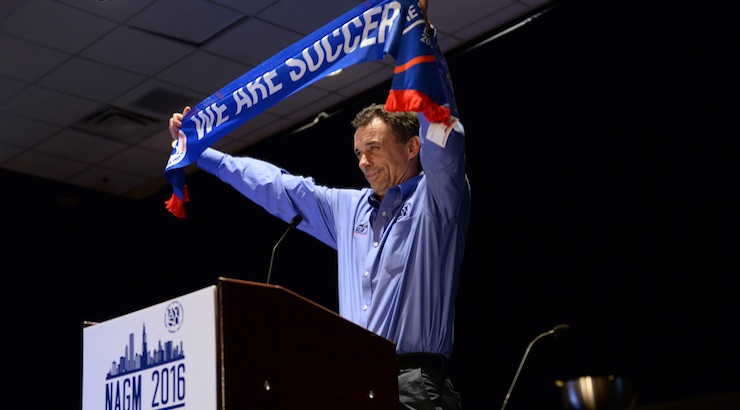
Here is Diane Scavuzzo’s exclusive interview with AYSO’s National Executive Director Mike Hoyer on how youth soccer and AYSO has changed today:
Diane Scavuzzo: AYSO has 50,000 teams and 500,000 players across the USA. How does AYSO fit into the big picture of youth soccer in America?
Mike Hoyer: We are here to give kids a good start in the world of soccer. We are the entry level — this is where a lot of kids get their first experience in soccer. We have a development-over-winning philosophy that is very old.
AYSO is a springboard for all sports programs and we help develop the spirit of good sportsmanship from an early age. When we commit that each and every player will play half the game, we might not win every match but more importantly, we are teaching important life lessons. We put our philosophies into play.
AYSO’s Six Philosophies – Everyone Plays, Balanced Teams, Open Registration, Positive Coaching, Good Sportsmanship and Player Development. These are the essence of AYSO and it all starts with Everyone Plays.
Diane Scavuzzo: You grew up playing soccer in AYSO?
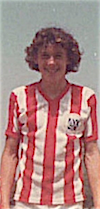
Mike Hoyer: Yes, I grew up playing the holy Trinity of sports. I can still remember when my AYSO coach took my family to see the World Cup at the Sports Arena — our soccer coach was from Holland and he went out of his way to make a difference.
I also played competitive tennis as well as track and field and basketball but I always had a strong passion for soccer and played in college.
Diane Scavuzzo: What is one of the biggest challenges in youth soccer today?
Mike Hoyer: The biggest challenge is parent education — or the lack of parent education in youth soccer today.
Many adults believe that real soccer is 11v11 and it is hard for them to leave that reference point. Other parents, who did not grow up playing the sport, only know what they see on TV — and once again it is the 11v11 format — but parents often fail to remember they are watching adults playing the game and not children.
Diane Scavuzzo: What is wrong with youth soccer in America?
Mike Hoyer: Youth soccer has improved in the past few years but the idea still lingers that the more you pay, the more you get and your child will be better off in the long run.
When the objective is to become the highest ranking team with the best win/loss record then it is not about developing the player but winning the matches.
We also have to focus on making soccer more accessible. Only 17% of US Households have one parent who stays home and can fully support outside activities. We need to offer flexible options so kids can participate in after school activities and make it easier on today’s busy families.
Diane Scavuzzo: What is it like to run such a huge organization?
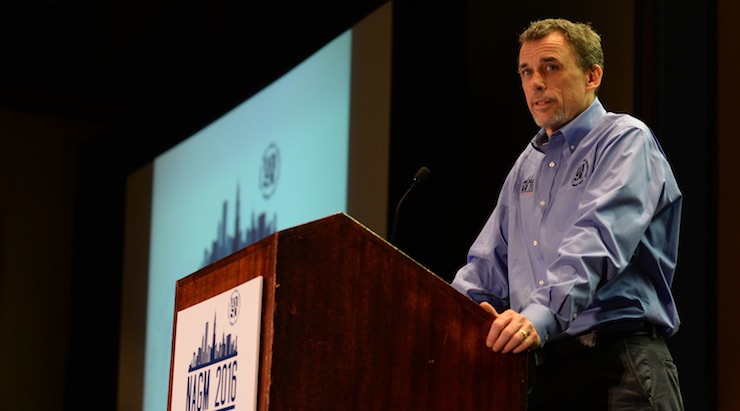
Mike Hoyer: I love it. There are a lot of great people — we know what the AYSO experience is and it is a great place to be. And, this is a great time to be at AYSO — the new Player Development mandates from U.S. Soccer focus on many of the cornerstones of AYSO. For example, small sided games have been a part of AYSO for as long as I can remember.
Diane Scavuzzo: What are you most concerned about when you think about youth soccer today?
Mike Hoyer: I am most concerned that kids are forced into choices too early, before they are physically and mentally ready. Choices that effect a kid’s entire future are being made when players are too young.
Our kids have to make tough choices. For example, my son retired from playing soccer when he was a high school freshman because marching band had 12 to 14 hours of practice every week. He didn’t have time to continue to play soccer and be in the band.
Another issue is coaches wanting to make young kids commit to full-time soccer and drop other sports. Specializing in any single sport too early is detrimental to a child’s development. Multiple-sport athletes are better athletes and make better soccer players.
Diane Scavuzzo: What is AYSO’s focus?
Mike Hoyer: We are a community based organization that is specifically child focused and our goal is to get the kids to come out and play soccer and have fun doing it. That our kids develop skills and can play with their friends is a bonus.
Recently, we have added new options to allow families to stay with AYSO and we have created a stronger collaboration with U.S. Soccer.
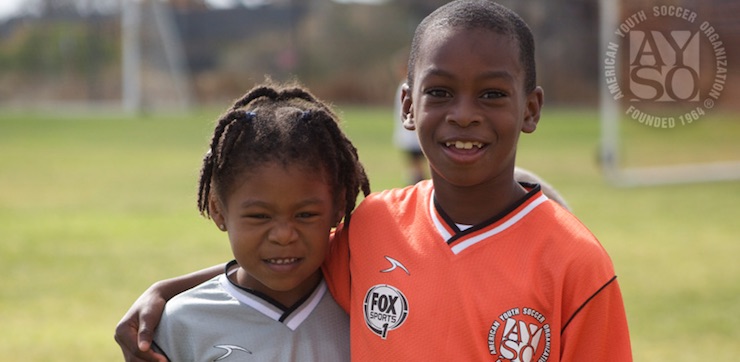
Diane Scavuzzo: Why is AYSO kicking off a competitive level of youth soccer called AYSO United?
Mike Hoyer: Our organization wanted this — we surveyed our families and over 9,200 responses came in. Many of our families have 2 or 3 children and as the kids grow up, some players want greater challenges. The desire is to keep the entire family within AYSO and not have older players leave to play on a different team.
AYSO United is a program that offers organized soccer for players who want to play at a more competitive level. Club soccer teams are in place in many parts of the country, but for those who want to play harder and still be a part of our organization, AYSO United is perfect.
Diane Scavuzzo: How much does it costs to play soccer in AYSO?
Mike Hoyer: On average, it costs about $100 per season to play soccer in AYSO. The fees are less expensive in rural areas and slightly more in urban markets.
To play competitive soccer in AYSO’s United program, the costs range from $600 to $2000 a year — and this is inclusive of all tournaments and team fees.
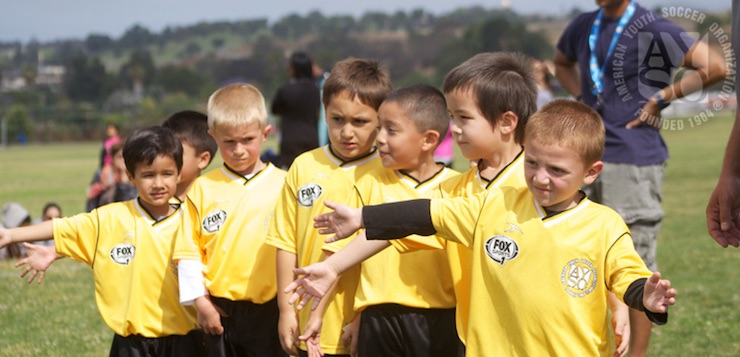 Diane Scavuzzo: These fees are relatively inexpensive, especially when compared to the costs of playing soccer on an entry level team in US Youth Soccer or US Club. Why do you think people pay so much money for youth soccer?
Diane Scavuzzo: These fees are relatively inexpensive, especially when compared to the costs of playing soccer on an entry level team in US Youth Soccer or US Club. Why do you think people pay so much money for youth soccer?
Mike Hoyer: They are buying a brand or a belief — with the influx of so many coaches from England and other parts of Europe, many parents are buying into the youth soccer club’s identity — but, it comes down to the coaching and is that child having a good time. Is it worthwhile? What are parents really paying for?
Diane Scavuzzo: There are families which spend a lot of money and time — almost every weekend watching their kids play competitive soccer….
Mike Hoyer: We do not believe youth soccer is supposed to take over your life but be a part of it — after all, very few kids are going to turn playing soccer into a career and become professional players.
Diane Scavuzzo: Is soccer a game accessible to all kids?
Mike Hoyer: There has been a real capitalization of youth soccer and it is preventing the growth of the game in America.
When you look at the imbalance of soccer facilities all across our country — and compare what is avaialble in the suburbs to what exists in the inner cities, the issues crystallize.
Soccer needs to be available to every kid who wants to play, and AYSO makes soccer affordable for many kids who otherwise could never play the game.







